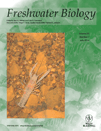
FRESHWATER BIOLOGY
Scope & Guideline
Fostering Innovation in Aquatic Research
Introduction
Aims and Scopes
- Freshwater Ecology and Biodiversity:
The journal focuses on the study of freshwater ecosystems, including lakes, rivers, wetlands, and streams. It emphasizes biodiversity, community structure, and the interactions among aquatic organisms. - Impact of Anthropogenic Activities:
Research examining the effects of human activities, such as urbanization, agriculture, and climate change, on freshwater ecosystems is central to the journal's scope. This includes studies on pollution, habitat alteration, and species invasions. - Eco-physiological Responses:
The journal publishes studies that investigate the physiological and behavioral responses of freshwater organisms to environmental stressors, including temperature fluctuations, nutrient availability, and hydrological changes. - Conservation and Management Strategies:
FRESHWATER BIOLOGY emphasizes research that informs conservation policies and management practices aimed at preserving freshwater biodiversity and ecosystem health. - Methodological Innovations:
The journal encourages the development and application of novel methodologies in freshwater biology, including the use of environmental DNA (eDNA) for biodiversity assessments and advanced statistical modeling techniques.
Trending and Emerging
- Climate Change Effects:
Research on how climate change impacts freshwater ecosystems, including shifts in species distributions, changes in phenology, and alterations in ecosystem functions, is increasingly prevalent. - Invasive Species Dynamics:
Studies examining the ecological consequences of invasive species and their interactions with native communities are gaining traction, highlighting the importance of understanding these dynamics in the context of biodiversity conservation. - Use of Environmental DNA (eDNA):
The application of eDNA methodologies for monitoring biodiversity and assessing ecosystem health is a rapidly growing area of interest, reflecting advancements in genetic technologies and their implications for freshwater biology. - Anthropogenic Impacts and Mitigation Strategies:
Research focusing on the interactions between human activities and freshwater ecosystems, along with strategies for mitigating negative impacts, is increasingly emphasized, underscoring the need for sustainable management practices. - Functional Trait Analysis:
There is a growing emphasis on understanding the functional traits of freshwater organisms and how these traits influence community dynamics and ecosystem processes, moving beyond traditional taxonomic approaches.
Declining or Waning
- Traditional Taxonomy:
Research focused solely on the taxonomy of freshwater species is decreasing as integrative approaches combining molecular techniques and ecological assessments gain popularity. - Single-species Studies:
There has been a noticeable decline in studies that focus exclusively on single species, with a shift towards examining community dynamics and ecosystem-level interactions. - Descriptive Studies without Ecological Context:
Papers that merely describe species or populations without linking findings to broader ecological implications or conservation strategies are becoming less common, as the journal prioritizes studies with clear ecological relevance.
Similar Journals
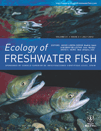
ECOLOGY OF FRESHWATER FISH
Pioneering research for sustainable aquatic futures.ECOLOGY OF FRESHWATER FISH is a premier academic journal dedicated to advancing the understanding of freshwater fish ecology, published by Wiley in Denmark. With an ISSN of 0906-6691 and an E-ISSN of 1600-0633, the journal has been a critical platform for researchers since its inception in 1992, and will continue through 2024. It holds an impressive Q2 ranking in multiple categories including Aquatic Science and Ecology according to the latest quartiles, reflecting its significance and impact in these fields. The journal is well-regarded with Scopus rankings placing it in the top percentiles for ecology-related disciplines, showcasing its contributions to the understanding of aquatic ecosystems. Although it does not offer open access, the journal is highly valued for its rigorous peer-review process and its commitment to publishing original research that informs policy and conservation efforts. By bridging the gap between theory and practice, ECOLOGY OF FRESHWATER FISH remains a vital resource for students, professionals, and researchers engaged in the study of freshwater environments.
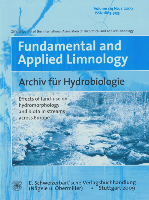
Fundamental and Applied Limnology
Innovating in Limnology: Where Research Meets Real-World ImpactFundamental and Applied Limnology is an esteemed academic journal dedicated to the exploration of freshwater ecosystems, bridging the gap between fundamental research and practical applications. Published by E Schweizerbart'sche Verlagsbuchhandlung in Germany, this journal has been a vital resource in the fields of aquatic science and ecology since its inception in 2007. With its ISSN 1863-9135 and E-ISSN 1863-9135, it provides a platform for researchers to disseminate significant findings related to limnology, contributing to a rich understanding of freshwater biodiversity, water quality, and ecological interactions. Although currently rated in the Q3 quartile for aquatic sciences and ecology as per the 2023 rankings, it remains a valuable outlet for interdisciplinary research and practical insights, facilitating critical advancements in environmental management. Open access options enhance its visibility and accessibility, making it indispensable for researchers, professionals, and students alike who are committed to advancing the scholarship in freshwater studies. Engaging with this journal not only opens doors to the latest research findings but also fosters collaboration and innovation in the ecological community.
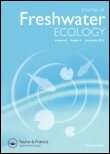
JOURNAL OF FRESHWATER ECOLOGY
Driving impactful research for ecological conservation.JOURNAL OF FRESHWATER ECOLOGY, published by Taylor & Francis Inc, is an esteemed source of research dedicated to advancing the understanding of freshwater ecosystems. Established in 1981, this Open Access journal has provided a platform for innovative studies and groundbreaking articles relevant to the fields of Aquatic Science and Ecology. With its HIndex reflecting a commitment to quality scholarship, the journal is currently classified in the Q3 category for both Aquatic Science and Ecology, Evolution, Behavior and Systematics, indicating its respectable impact within these disciplines. The journal ranks within the 45th percentile in Ecology and the 41st percentile in Aquatic Science on Scopus, highlighting its relevance to a global audience of researchers and practitioners. By facilitating unrestricted access to research findings since 2017, JOURNAL OF FRESHWATER ECOLOGY aims to enrich our understanding of freshwater systems and their conservation, making it an essential resource for those invested in ecological research and environmental sustainability.

Freshwater Crayfish
Fostering Insights into Crayfish Behavior and EcologyFreshwater Crayfish, published by the International Association of Astacology, is a peer-reviewed journal dedicated to the comprehensive study of freshwater crayfish, encompassing their ecology, behavior, conservation, and management. With an ISSN of 2076-4324 and an E-ISSN of 2076-4332, this journal serves as an essential platform for researchers, professionals, and students in aquatic science, particularly within the fields of Ecology, Evolution, Behavior and Systematics and Aquatic Science, where it ranks notably in Scopus rankings. The journal has a consistent publication history since 2008, enhancing its relevance and contribution to the scientific community. While it operates under an open-access model, allowing for wide dissemination of research findings, it is particularly noted for its significant impact on advancing knowledge in the preservation and sustainable management of crayfish species. This makes Freshwater Crayfish a vital resource for those passionate about aquatic biodiversity and conservation.

Palawan Scientist
Advancing Knowledge in Biodiversity and ConservationPalawan Scientist is a distinguished academic journal published by the Western Philippines University, contributing to the fields of environmental science, biodiversity, and conservation. With its ISSN 2467-5903, this journal aims to foster scientific exchange by providing a platform for high-quality research articles, reviews, and case studies that focus on the unique ecological landscapes of Palawan and its global significance. Although it does not currently offer open access, the journal is committed to delivering impactful findings that inform both local and international environmental policies. Researchers, professionals, and students alike can benefit from the insights generated within its pages, making it a valuable resource for anyone invested in the preservation of our planet’s biodiversity. This journal plays a vital role in highlighting the importance of Palawan’s ecosystems, thereby contributing to placing the region on the scientific map.

INTERNATIONAL REVIEW OF HYDROBIOLOGY
Pioneering Insights in Hydrobiology and EcologyINTERNATIONAL REVIEW OF HYDROBIOLOGY is a prestigious academic journal dedicated to the dynamic fields of Aquatic Science and Ecology, Evolution, Behavior, and Systematics. Published by a reputable German publisher, this open-access journal ensures that groundbreaking research is readily available to a global audience, fostering collaboration and innovation within the scientific community. With an impressive impact factor and classification within the Q2 category of both Aquatic Science and Ecology, it ranks notably high on Scopus, standing at 211 out of 721 in Ecology and 84 out of 247 in Aquatic Science as of 2023. Covering a broad scope from fundamental hydrobiological research to applied ecological studies, the journal plays a crucial role in advancing knowledge and addressing contemporary environmental challenges. Researchers, professionals, and students will find INTERNATIONAL REVIEW OF HYDROBIOLOGY to be an essential resource for informing their own work and contributing to the global dialogue on aquatic systems and their conservation.

MARINE AND FRESHWATER RESEARCH
Diving into the dynamics of ecosystems.Marine and Freshwater Research is a prestigious journal published by CSIRO PUBLISHING that serves as a key platform for the dissemination of cutting-edge research in the fields of Aquatic Science, Ecology, and Oceanography. With an impactful presence since its inception in 1948, the journal provides critical insights into the dynamics of freshwater and marine ecosystems, promoting interdisciplinary approaches that contribute to our understanding of biodiversity and sustainability. Currently ranked in the Q2 category across major scientific domains, including Ecology and Aquatic Science, it enjoys a robust academic reputation supported by impressive Scopus rankings, such as Rank #66/247 in Aquatic Science and Rank #44/145 in Oceanography, reflecting its high citation impact and relevance. While offering a subscription-based access model, the journal remains dedicated to fostering dialogue and innovation within the scientific community, aiming to bridge the gap between research findings and practical applications in environmental management. Located in Australia, Marine and Freshwater Research is an essential resource for researchers, professionals, and students dedicated to exploring the complexities of aquatic ecosystems and advocating for their preservation.

LIMNETICA
Connecting researchers to the pulse of aquatic science.LIMNETICA is a prestigious academic journal dedicated to advancing the field of Aquatic Science, Ecology, and Water Science and Technology. Published by the Asociación Española de Limnología in Spain, this journal serves as a vital platform for researchers and professionals seeking to share their findings and insights from 1996 to 2024. With a commendable Q2 ranking in Ecology and notable Q3 rankings in Aquatic Science and Water Science and Technology, LIMNETICA emphasizes high-quality, peer-reviewed research that contributes to our understanding of freshwater ecosystems. Although currently not classified under Open Access, its rigorous indexing and Scopus rankings—positioning it in the top 64th percentile for Environmental Science—illustrate its impact in the scientific community. Researchers, students, and professionals are encouraged to engage with LIMNETICA to stay abreast of key developments and foster collaborative efforts in aquatic research.
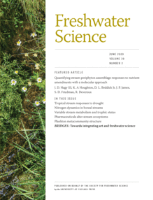
Freshwater Science
Connecting Researchers for a Thriving Aquatic FutureFreshwater Science is a pivotal journal published by the University of Chicago Press, dedicated to advancing the understanding of freshwater ecosystems and their biodiversity. With an ISSN of 2161-9549 and an E-ISSN of 2161-9565, this journal has been a vital resource in the fields of Aquatic Science and Ecology, consistently ranked in the Q2 quartile across multiple categories in 2023. The journal encapsulates rigorous research and innovative studies aimed at addressing the ecological dynamics of freshwater environments from 2012 to 2024. Researchers and practitioners benefit from its open access options, which enhance the dissemination of knowledge while contributing to a better understanding of aquatic systems. With Scopus rankings that place it in the top 30% of its fields, Freshwater Science plays an influential role in fostering scientific dialogue and collaboration among professionals, making it an essential publication for anyone invested in freshwater conservation, management, and ecological impact.
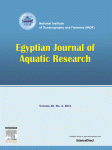
Egyptian Journal of Aquatic Research
Exploring the depths of aquatic ecology and evolution.Welcome to the Egyptian Journal of Aquatic Research, a premier peer-reviewed academic journal published by ELSEVIER, dedicated to advancing the field of aquatic sciences. With a robust impact factor and recognition as a Q1 journal in key categories such as Aquatic Science and Ecology, this open access journal has established itself as a vital platform for disseminating high-quality research since its inception in 2012. The journal aims to provide comprehensive coverage of topics including ecology, evolutionary biology, and water science, making it a crucial resource for researchers, professionals, and students engaged in these dynamic fields. With Scopus rankings placing it in the top echelons of various categories, the Egyptian Journal of Aquatic Research fosters innovation, collaboration, and knowledge dissemination on a global scale, making it an indispensable asset for anyone invested in understanding and preserving aquatic systems.